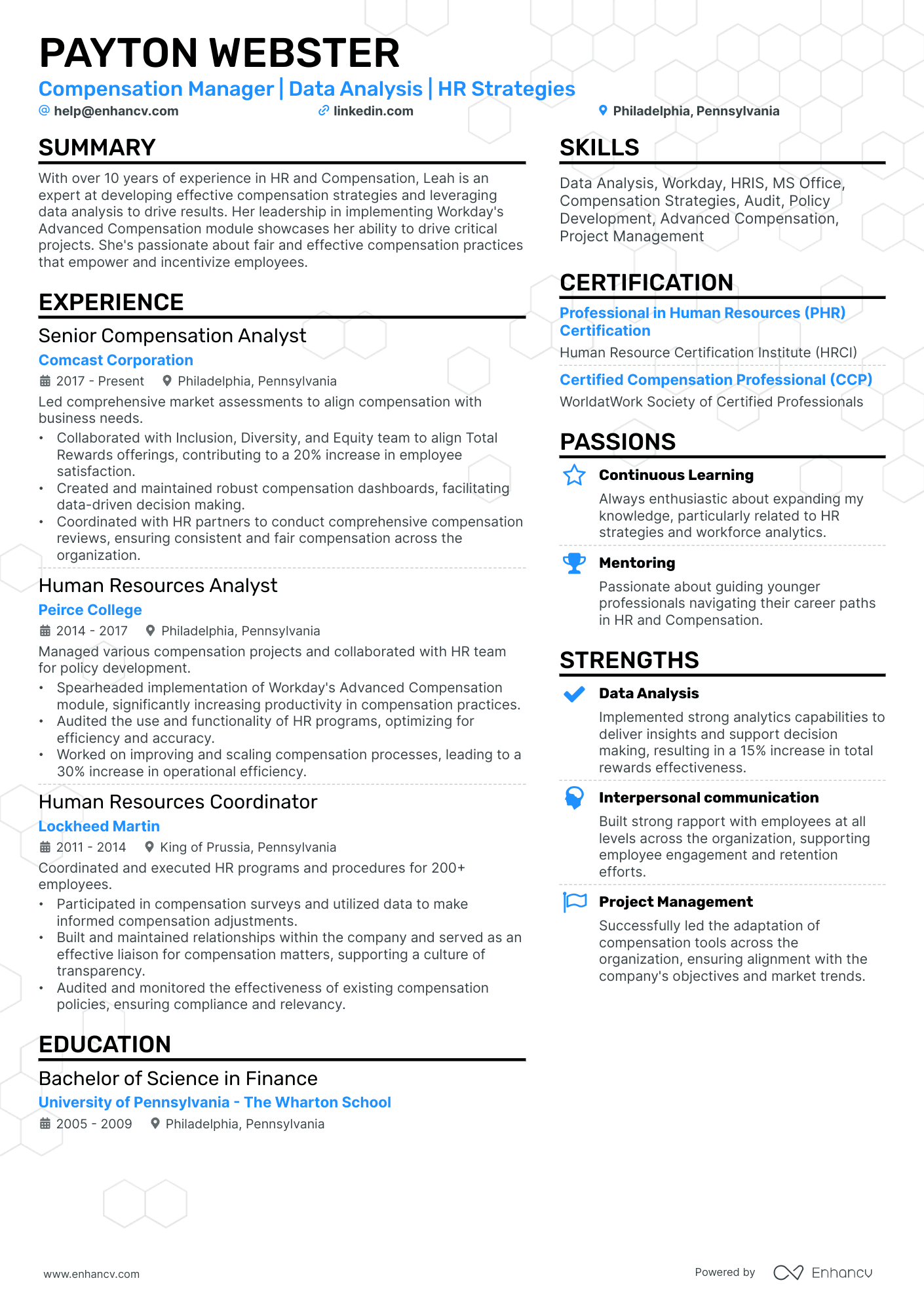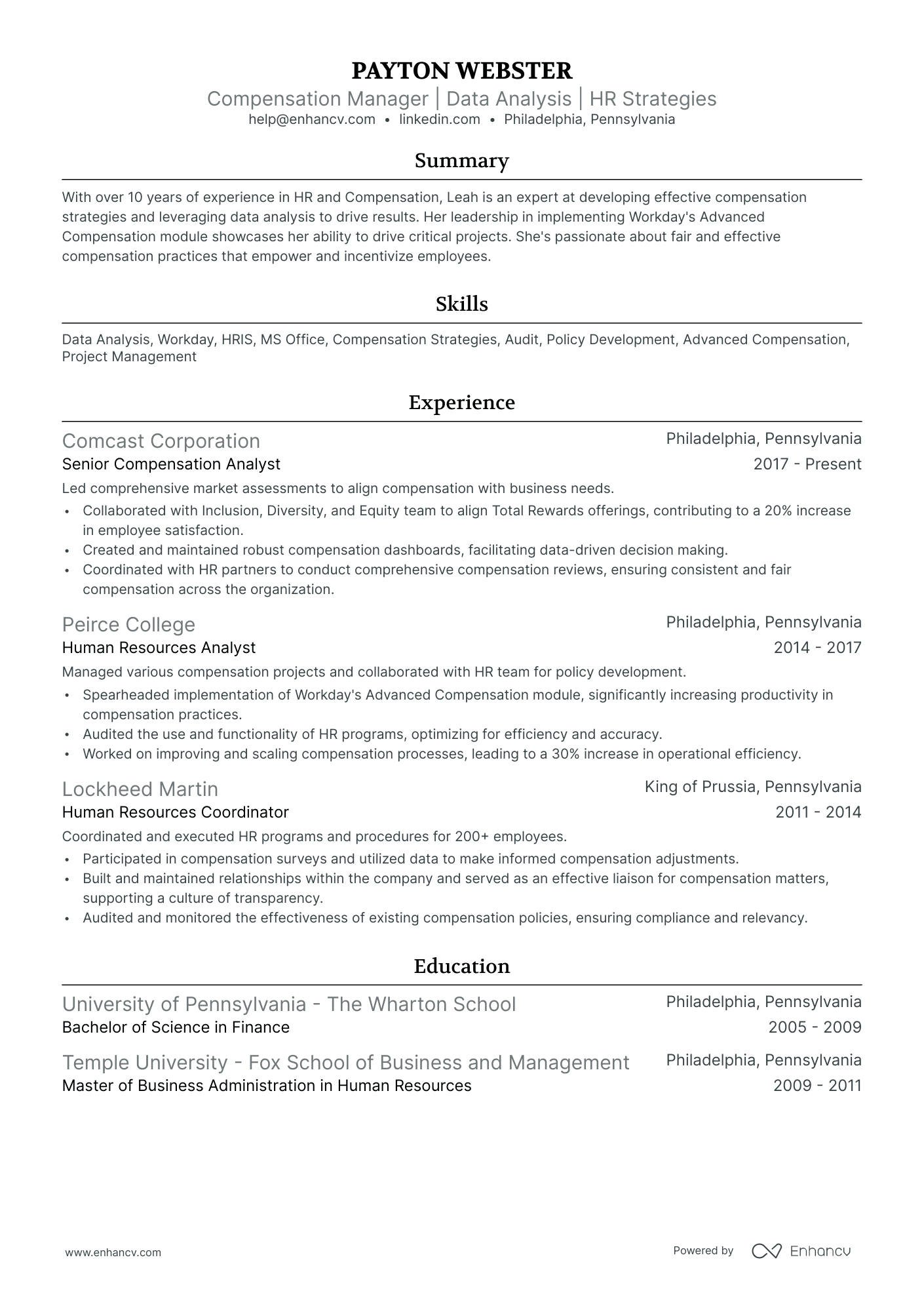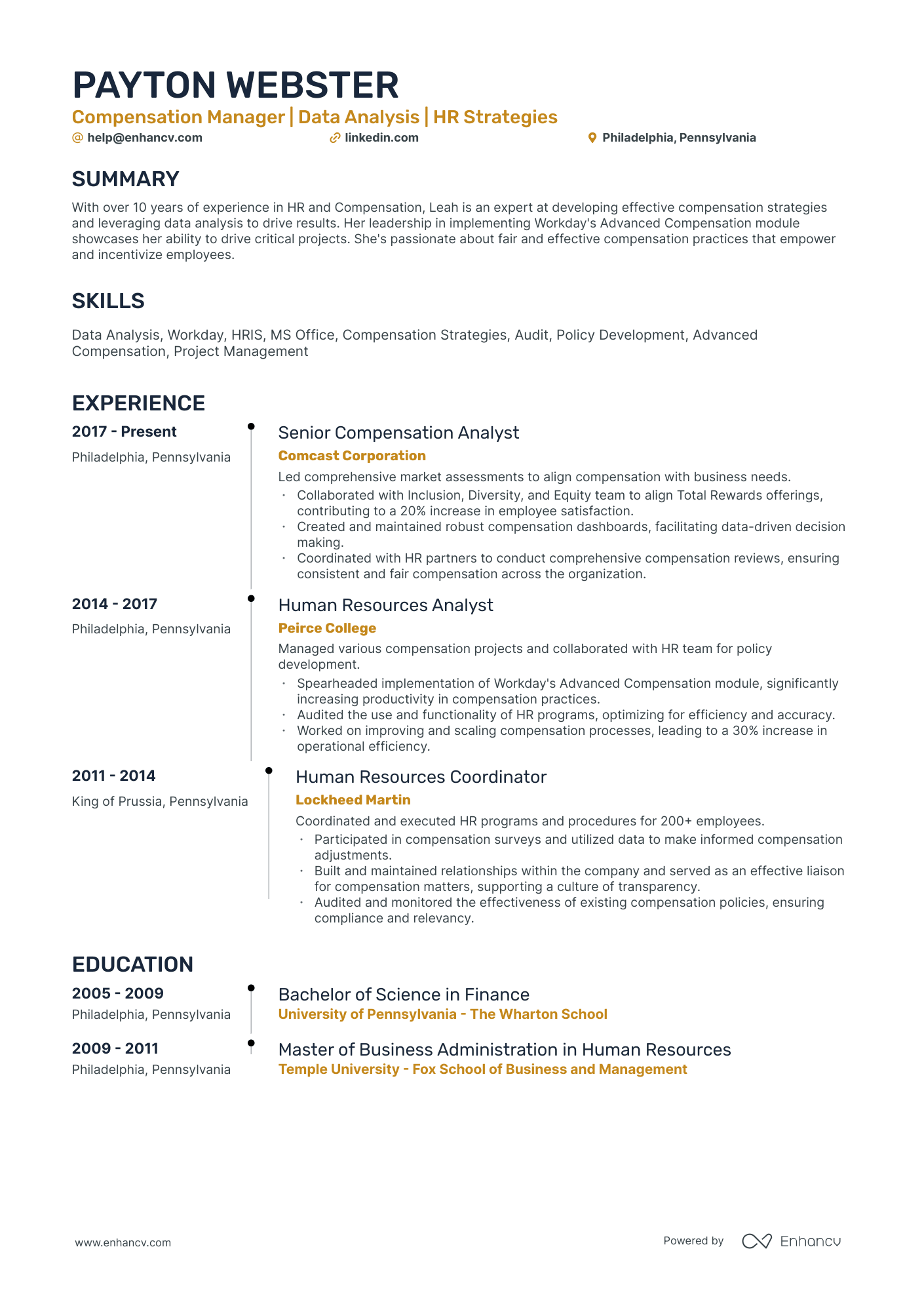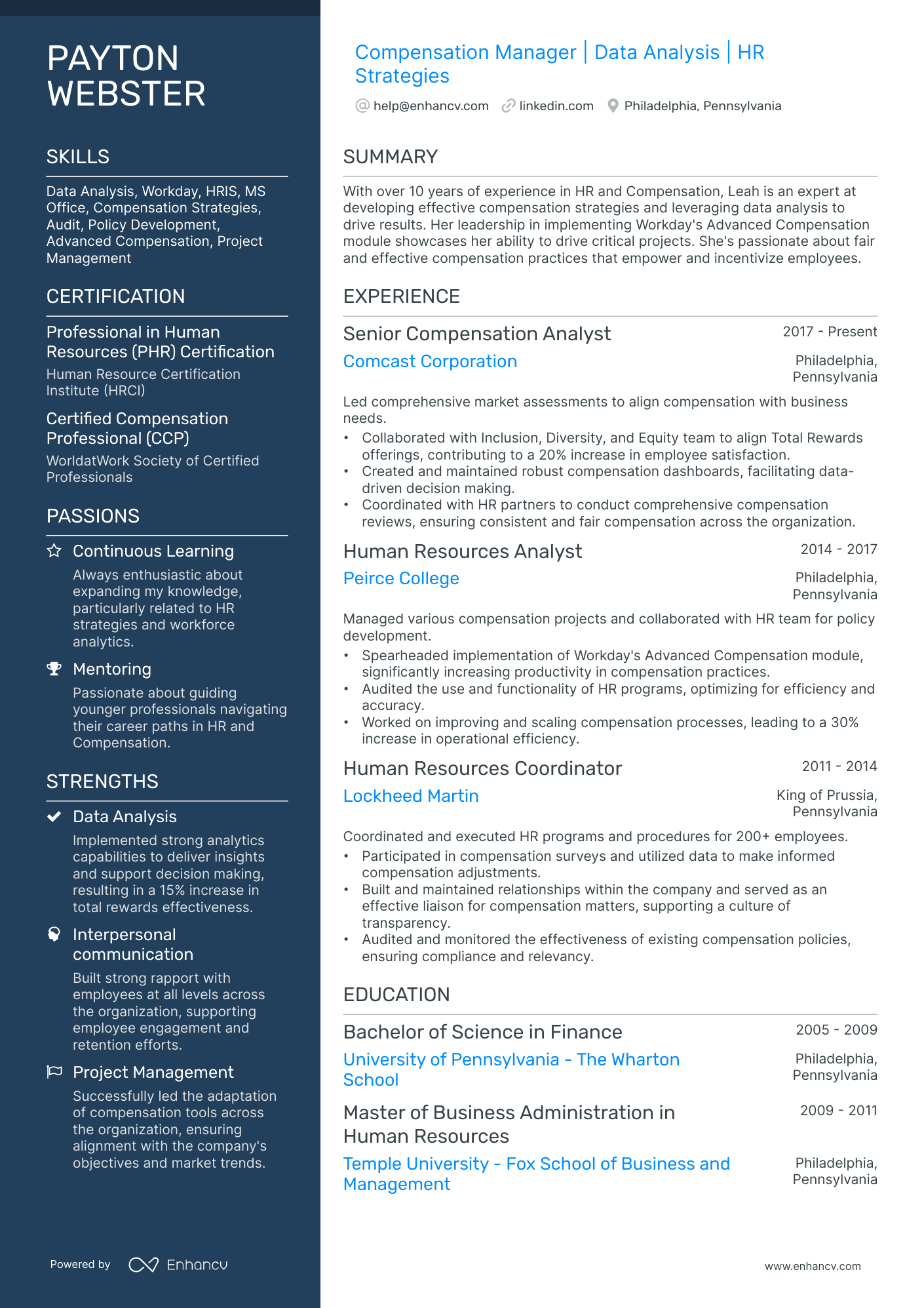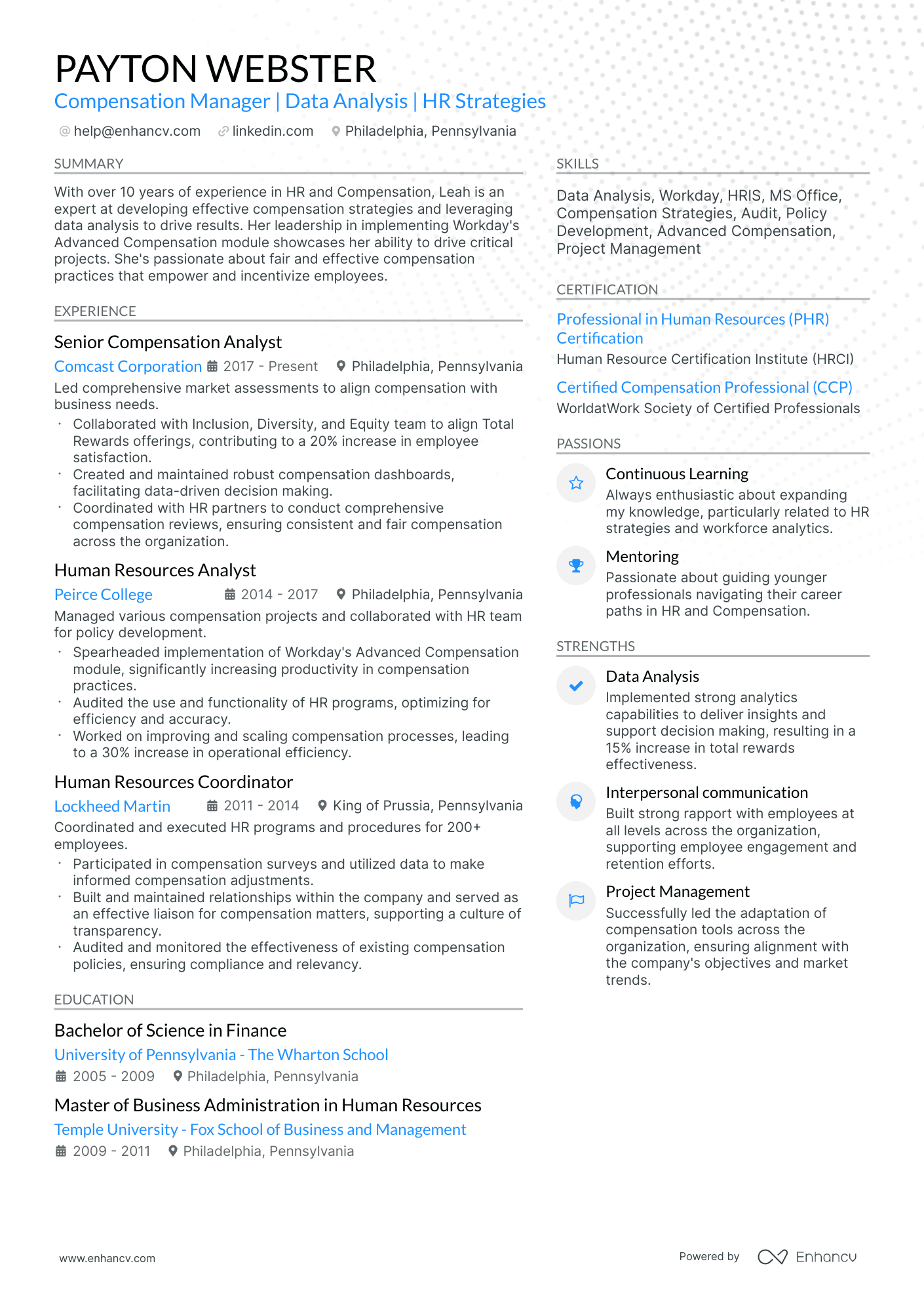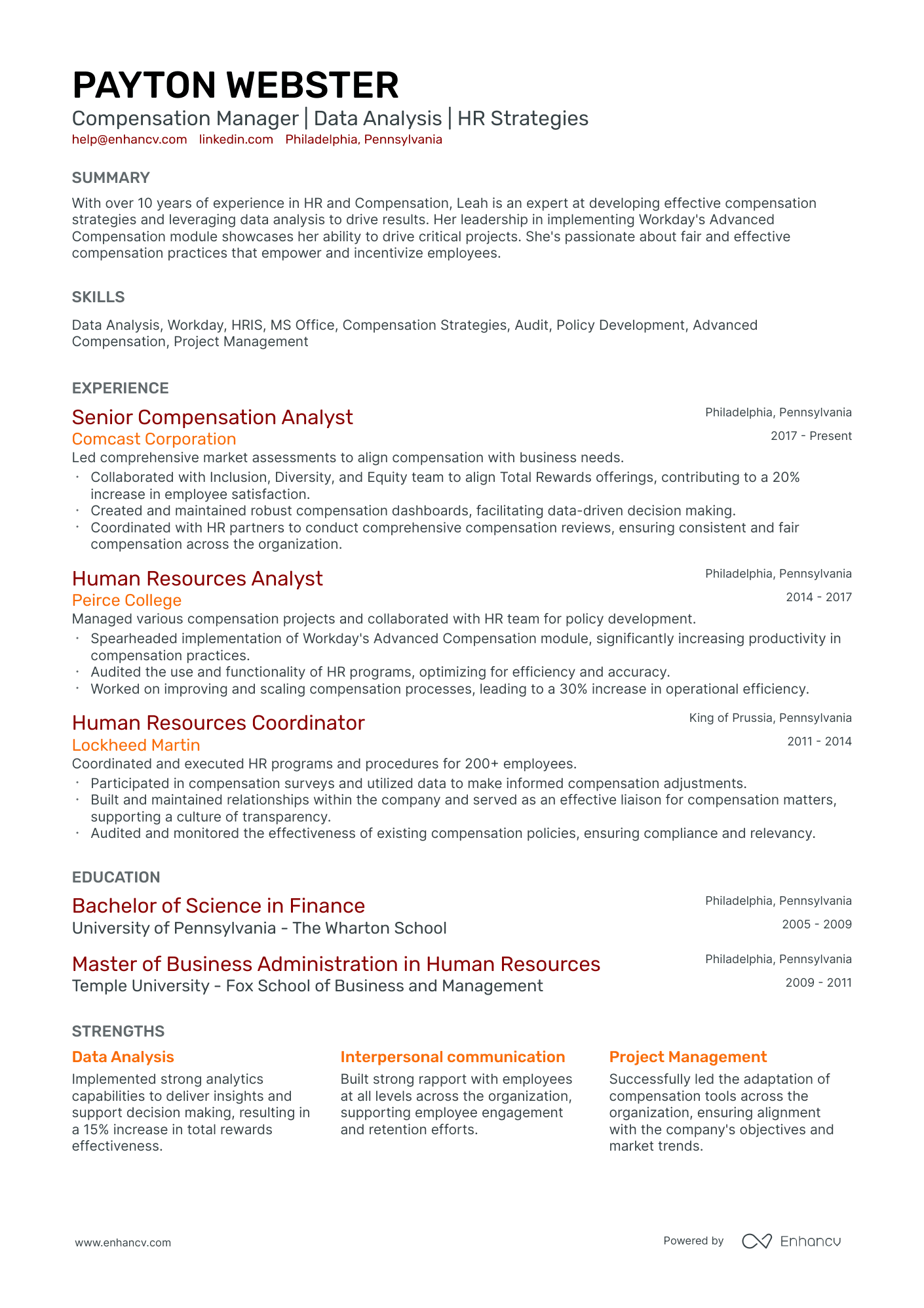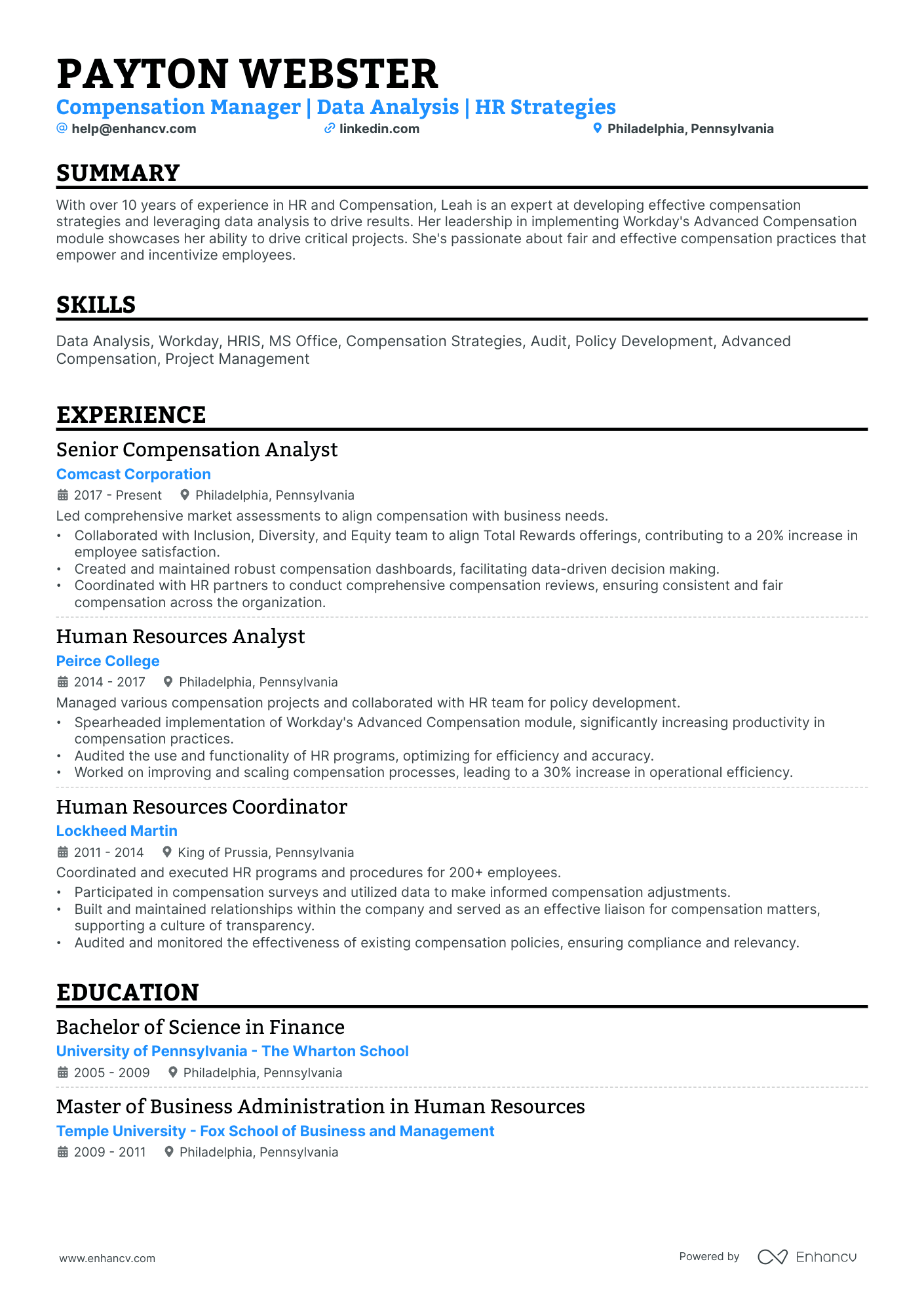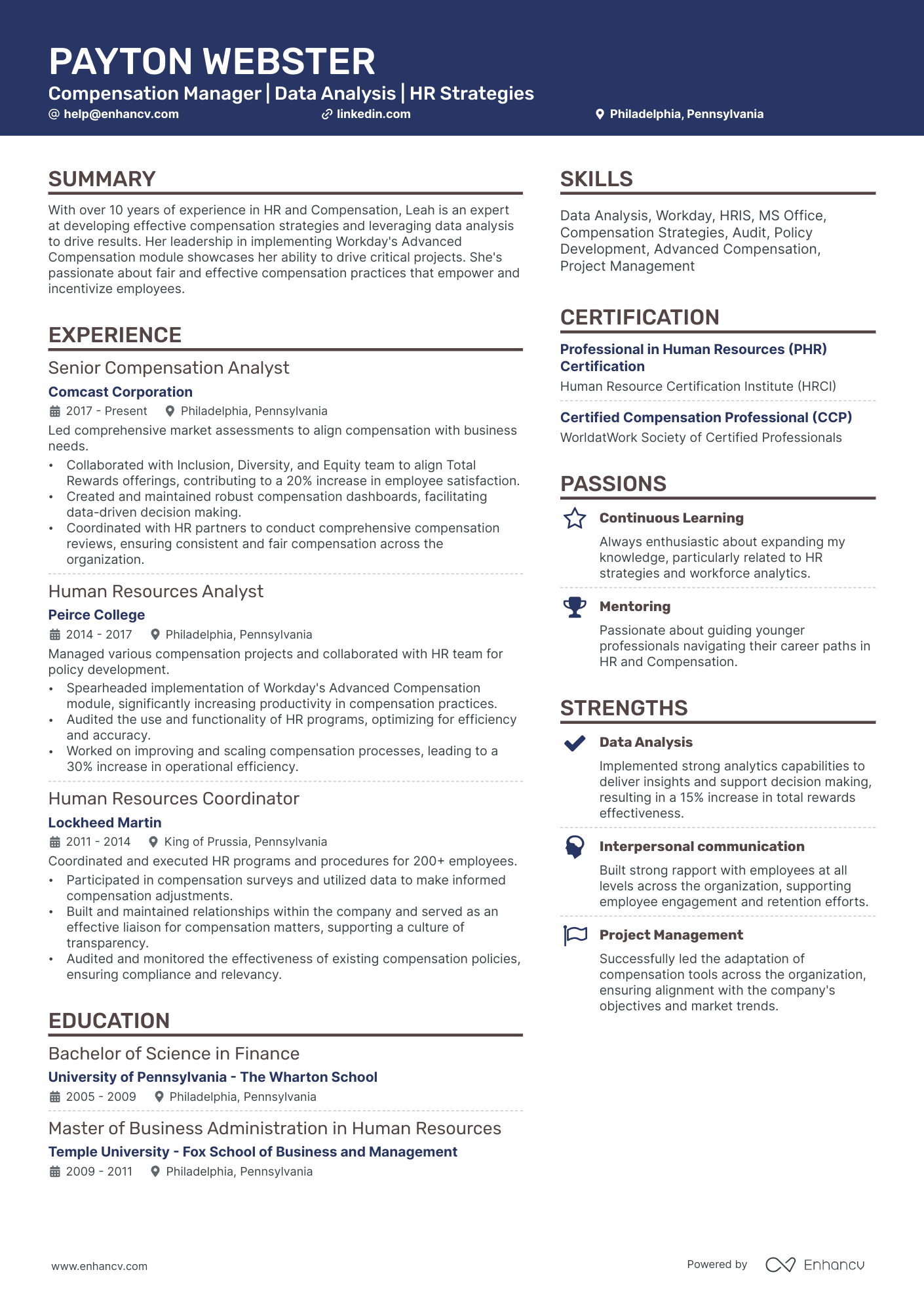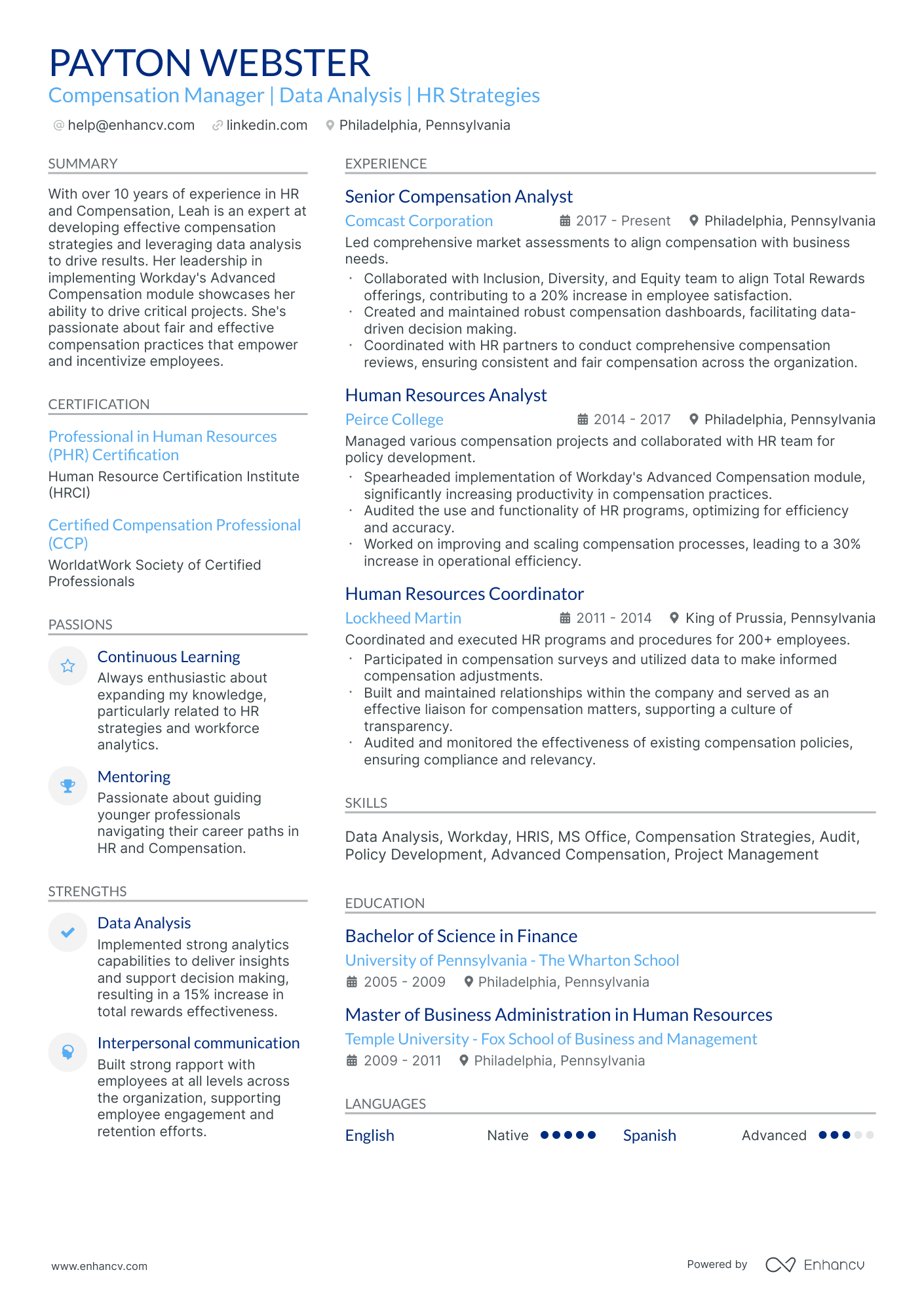A significant challenge faced by a compensation manager when crafting their resume is articulating complex compensation strategies and accomplishments in a way that non-HR professionals can comprehend. Our guide can assist by providing clear instructions on translating technical HR jargon into everyday language, making your accomplishments understandable and impressive to all potential employers.
Dive into our comprehensive guide to crafting a standout compensation manager resume:
- Discover compensation manager resume samples that have secured positions at top-tier companies.
- Master the aesthetics of your resume layout for maximum impact.
- Strategically present your achievements and skills across various resume sections.
- Convey to recruiters why you're the perfect fit for the job.
Recommended reads:
Crafting an impeccable compensation manager resume format in four steps
Your compensation manager resume format should be both strategic and reader-friendly. Here's a concise guide to help you achieve that:
- Choose a format that aligns with the job's requirements. If your expertise is directly relevant, the reverse-chronological format is ideal. If you're focusing more on skills, consider the functional or hybrid formats.
- Header: Ensure it's populated with accurate contact details and any relevant portfolio links.
- Length: A one-page resume is standard, but if you have extensive experience, extending to two pages is acceptable.
- File type: To maintain formatting consistency, always opt for PDF.
Upload your resume
Drop your resume here or choose a file. PDF & DOCX only. Max 2MB file size.
Pro tip
While color can enhance your compensation manager resume by emphasizing key details like headlines, job titles, and degrees, moderation is key. Stick to a primary and a secondary color to maintain professionalism and avoid a cluttered appearance.
Essential compensation manager resume sections for a comprehensive overview:
- Header: Enables recruiters to swiftly access your contact details and peruse your latest work portfolio.
- Summary or Objective: Offers a snapshot of your career milestones and aspirations.
- Experience: Demonstrates alignment with job prerequisites and highlights your tangible contributions.
- Skills: Captures the full spectrum of your expertise, making you a compelling compensation manager candidate.
- Education & Certifications: Bridges potential experience gaps and underscores your dedication to the field.
What recruiters want to see on your resume:
- Relevant Experience: Proven track record in designing, implementing and managing compensation programs in prior roles.
- Knowledge of Laws and Regulations: Familiarity with federal, state, and local laws and regulations related to compensation. Certification such as Certified Compensation Professional (CCP) is a plus.
- Analytical Skills: Strong ability to analyze complex data sets and market trends to make informed decisions about compensation structures.
- Proficiency in Compensation Management Systems: Proficient in using compensation management software like PayScale, Salary.com or similar systems.
- Negotiation and Communication Skills: Excellent negotiation skills to deal with employees, vendors, and consultants. Strong communication skills to clarify compensation policies to employees and leaders.
Recommended reads:
Strategies for crafting your compensation manager resume experience section
When detailing your compensation manager resume experience, it's essential to pair responsibilities with tangible achievements.
Consider including:
- Key responsibilities, emphasizing their significance to your role, team, or organization.
- Experiences that have fostered your technical acumen or professional growth.
- Metrics that underscore your contributions and successes.
- Challenges you've addressed and the solutions you've implemented.
- Strategies you've devised and their measurable impact on growth.
Your experience section is pivotal in making a lasting impression on recruiters. To inspire you, we've curated real-world compensation manager examples:
- Developed and implemented a comprehensive compensation strategy resulting in a 10% increase in employee retention.
- Managed the annual salary review process for a workforce of 1,000+ employees.
- Conducted market research and analyzed industry trends to ensure competitive pay practices.
- Collaborated with HR team to design and administer variable pay programs aligned with organizational goals.
- Led the implementation of a new compensation software system, streamlining processes and improving accuracy.
- Designed and managed executive compensation programs for senior leadership, resulting in increased company performance.
- Led the development and administration of sales incentive programs, contributing to a 20% boost in sales revenue.
- Conducted job evaluations and market pricing analysis to ensure internal equity and external competitiveness.
- Implemented a merit-based performance management system, linking pay with individual and team achievements.
- Collaborated with finance and legal teams to ensure compliance with regulatory requirements and reporting standards.
- Managed the annual budgeting process for compensation programs, effectively allocating resources and controlling costs.
- Developed and delivered training programs on compensation policies and practices to HR business partners.
- Led the redesign of the job classification and salary structure, resulting in improved internal fairness and pay alignment with market rates.
- Implemented a comprehensive job evaluation framework, ensuring consistent and objective assessment of roles.
- Collaborated with external consultants to conduct a total rewards benchmarking study and recommended improvements.
- Managed a team of compensation analysts, providing guidance and support for daily operations.
- Designed and implemented a sales commission plan resulting in a 15% increase in overall sales performance.
- Conducted cost analysis and feasibility studies for new benefit programs, optimizing resource allocation.
- Led the integration of compensation plans after a merger, ensuring smooth transition and employee satisfaction.
- Developed and maintained salary structures, conducting regular market analysis to ensure competitiveness.
- Develop and execute global compensation strategies aligned with business objectives.
- Lead the annual salary review process for a multinational workforce, ensuring fair and competitive pay practices.
- Design and implement executive compensation programs to attract and retain top talent worldwide.
- Manage the performance-based bonus program, driving high performance and achieving corporate goals.
- Collaborate with cross-functional teams on mergers and acquisitions to integrate compensation plans and harmonize pay structures.
- Led the development and implementation of a job leveling framework, enhancing career progression and internal mobility.
- Conducted salary surveys and benchmarked positions against industry peers, ensuring competitive compensation packages.
- Developed and maintained stock option plans, enabling effective employee equity participation.
- Analyzed compensation data to identify trends and provided recommendations for adjustments and improvements.
- Collaborated with the HR team to establish pay guidelines and policies in alignment with legal requirements and market best practices.
- Managed the annual incentive plan for sales employees, resulting in a 10% increase in sales performance.
- Implemented a job evaluation system, ensuring consistent and fair assessment of job roles.
- Conducted analysis of external market data to determine competitiveness of compensation programs.
- Designed and implemented a recognition program to motivate and engage employees across all levels.
- Collaborated with finance and accounting teams to ensure accurate and timely processing of payroll and bonus payments.
- Developed and implemented a total rewards strategy, encompassing compensation, benefits, and recognition programs.
- Managed the company's annual salary planning process, ensuring fairness and consistency across the organization.
- Conducted data analysis to evaluate the effectiveness of compensation programs and made recommendations for enhancements.
- Collaborated with HR business partners to provide guidance on compensation-related matters and resolve employee queries.
- Led the implementation of a new HRIS system, streamlining compensation administration processes.
- Oversaw the design and delivery of a comprehensive sales incentive program, resulting in a 25% revenue growth.
- Developed and maintained job descriptions and salary structures to ensure internal equity and market competitiveness.
- Led the annual performance management process, aligning individual performance with compensation decisions.
- Conducted audits and analysis of compensation data to ensure compliance with legal and regulatory requirements.
- Collaborated with finance and accounting teams to manage the company's bonus accrual process and budget.
- Participated in the development and implementation of a new job evaluation system, improving job grading accuracy.
- Conducted competitive analysis to make recommendations on salary adjustments and benefit enhancements.
- Managed the administration of employee stock option plans and ensured accurate record keeping.
- Collaborated with HR partners to address compensation-related issues and provide guidance on policies and practices.
- Assisted in the preparation of compensation-related communication materials for employees and managers.
The following content includes information from "O*NET OnLine" by the U.S. Department of Labor, Employment and Training Administration (USDOL/ETA). Used under the CC BY 4.0 license. The data represents the top responsibilities present on the task lists for compensation manager professionals.
Top Responsibilities for Compensation Manager:
- Direct preparation and distribution of written and verbal information to inform employees of benefits, compensation, and personnel policies.
- Design, evaluate, and modify benefits policies to ensure that programs are current, competitive, and in compliance with legal requirements.
- Fulfill all reporting requirements of all relevant government rules and regulations, including the Employee Retirement Income Security Act (ERISA).
- Analyze compensation policies, government regulations, and prevailing wage rates to develop competitive compensation plan.
- Identify and implement benefits to increase the quality of life for employees by working with brokers and researching benefits issues.
- Manage the design and development of tools to assist employees in benefits selection, and to guide managers through compensation decisions.
- Administer, direct, and review employee benefit programs, including the integration of benefit programs following mergers and acquisitions.
- Mediate between benefits providers and employees, such as by assisting in handling employees' benefits-related questions or taking suggestions.
- Plan, direct, supervise, and coordinate work activities of subordinates and staff relating to employment, compensation, labor relations, and employee relations.
- Prepare detailed job descriptions and classification systems and define job levels and families, in partnership with other managers.
Quantifying impact on your resume
<ul>
Strategies for candidates with limited resume experience
Lack of extensive experience doesn't mean you can't make a strong impression. Here's how:
- Thoroughly understand the role's requirements and reflect them in key resume sections.
- Highlight transferable skills and personal attributes that make you a valuable candidate.
- Use the resume objective to articulate your growth vision within the company.
- Emphasize technical alignment through relevant certifications, education, and skills.
Remember, your resume's primary goal is to showcase how you align with the ideal candidate profile. The closer you match the job requirements, the higher your chances of securing an interview.
Recommended reads:
Pro tip
Ensure your compensation manager experience descriptions resonate with both tech-savvy and non-tech audiences. Adopting a consistent format, such as task-action-result, can lend clarity and coherence to your experience section.
Essential compensation manager resume skills
When recruiters review compensation manager resumes, they're looking for a mix of technical know-how and personal attributes.
Technical skills demonstrate your proficiency in specific tools or tasks. They indicate if you're ready to jump into the role or if you'll need extensive training.
On the other hand, soft skills reflect your interpersonal abilities. They show how you'll fit into a team or company culture.
To effectively present these skills on your resume:
- Design a skills section that highlights both your technical and interpersonal strengths.
- Provide examples where you've applied these skills, such as projects or tasks.
- For soft skills, describe situations where they've been crucial to your success.
- Use metrics, like improved efficiency or positive feedback, to validate your skills.
For inspiration, explore the preferred skills of leading compensation manager professionals.
Top skills for your compensation manager resume:
Compensation Analysis Software
HRIS Systems (e.g., Workday, SAP SuccessFactors)
Excel Advanced Functions
Market Salary Data Analysis Tools
Job Evaluation Methodologies
Statistical Analysis Software (e.g., SPSS, R)
Payroll Systems Management
Compensation Benchmarking Tools
Regulatory Compliance Knowledge (e.g., FLSA, IRS)
Data Visualization Tools (e.g., Tableau, Power BI)
Analytical Thinking
Attention to Detail
Problem Solving
Effective Communication
Negotiation Skills
Interpersonal Skills
Project Management
Adaptability
Conflict Resolution
Strategic Thinking
Next, you will find information on the top technologies for compensation manager professonals from "O*NET OnLine" by the U.S. Department of Labor, Employment and Training Administration (USDOL/ETA). Used under the CC BY 4.0 license.
Top technologies for Compensation Manager’s resume:
- Oracle PeopleSoft
- Workday software
- Microsoft PowerPoint
- Human resource management software HRMS
- Vantage Point Software HRA
Pro tip
Targeting the needed job ad skills doesn't have to end with the skills section. You can talk about your related certifications, interests or additional experience via projects or volunteering, where you picked up those skills, too.
Optimizing the education and certification sections of your compensation manager resume
Your education and certification sections can be game-changers on your compensation manager resume, showcasing your commitment to professional growth.
For the education section:
- Highlight advanced education, noting the institution and duration.
- If you're currently studying, mention your expected graduation date.
- Exclude degrees that don't align with the job's requirements.
- If relevant, delve into your academic journey, spotlighting significant achievements.
When listing degrees and certifications:
- Feature those directly relevant to the role.
- Highlight recent and significant knowledge or certifications at the top of your resume.
- Provide essential details like the issuing institution and dates for credibility.
- Avoid listing irrelevant degrees or certifications, such as your high school diploma or unrelated specializations.
Remember, even if you're tempted to omit your education or certifications, they can offer a competitive edge, signaling a long-term commitment to the industry.
Best certifications to list on your resume
Pro tip
List your degrees in reverse order, starting with the newest. A recent PhD or unique field could set you apart.
Recommended reads:
Best practices for your compensation manager resume summary or objective
How do you know if you should include a resume summary or a resume objective?
- Resume summaries are ideal for compensation manager professionals with more experience, who'd like to give a quick glimpse of their biggest career achievements in the top one-third of their resumes.
- On the other hand, resume objectives serve as a road map to the applicant's aspirations. Candidates use the objective as the North Star of their career (or, how they see themselves in the role in the next few years).
Both could be the perfect fit for your compensation manager resume, depending on your experience.
Here's how candidates for the compensation manager job structure their summaries and objectives.
Resume summary and objective examples for a compensation manager resume
- Experienced compensation manager with a decade-long track record in the healthcare industry, adept at designing equitable pay structures. Demonstrated ability to conduct comprehensive market surveys and implement them into strategic compensation plans. Noted for improving staff retention by 35% via revised salary and bonus programs.
- Distinguished finance professional with 8 years of experience transitioning to a career as a compensation manager. Proven analytical skills and familiarity with financial data management systems. Known for implementing a profit-sharing scheme that boosted company profitability by 20%.
- Seasoned HR strategist with over 12 years of experience, ready to leverage skills in a new role focusing on compensation management. Expertise includes talent acquisition, performance evaluation, and developing incentive plans. Awarded for creating a merit-based reward system that increased employee morale significantly.
- High-performing operations manager with a 7-year history aiming to apply analytical strengths in a compensation manager capacity. Skilled in budget planning, forecasting, and maintaining internal controls. Successfully managed a $5M operational budget, aligning financial strategies with business objectives.
- Eager to bring strong quantitative background and passion for data analysis into the realm of compensation management. A recent graduate in business administration with a focus on human resources; excels in course work related to labor laws, payroll systems, and employment contracts.
- Master's degree holder in Business Analytics aspiring to commence a career in compensation management. Proficient in statistical modeling and predictive analysis. Keen to employ these skills to develop efficient and fair compensation systems.
Four additional sections to consider for your compensation manager resume
To give a fuller picture of who you are, consider adding these sections to your compensation manager resume:
- Awards - to showcase your achievements.
- Interests - to share passions outside of work.
- Publications - to highlight your contributions to the field.
- Projects - to spotlight significant accomplishments, even those outside of traditional work settings.
Key takeaways
- A clear resume layout helps present your info well.
- Use all main resume sections to show how you fit the job.
- Detail specific skills or tasks and their impact.
- Show your personality through interests or hobbies.
- List certifications to back up your technical skills.
